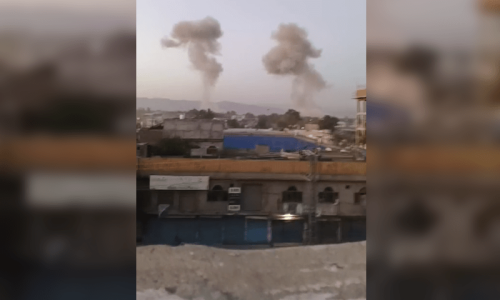THE cool cat is flustered. A grimace has replaced the perma-grin. Trouble is a comin’. But we have seen this Asif before.
Back during memogate; back when Haqqani’s conniving put himself and his boss in real danger; back when Zardari had to be flown off to Dubai and the country left wondering if it still had a president.
Back when things were different, when the transition to democracy was relatively new. Back then Asif recovered.
Husain was kicked to the kerb, Gilani stood his ground, Nawaz backed off, Kayani abided by the second-term deal and Pasha was made to drift into retirement.
Back then Zardari looked like the uber survivor and the grin soon reappeared. But this round is exposing the frailties.
What are the boys really up to? The baseline is clear: they want the worst excesses cut out and some semblance of acceptability returned to Karachi and Sindh.
Now, assume you’re Zardari. You’d have two problems with that baseline. First, you can’t be sure that’s the real intention — do a bit of trimming and pruning and, next thing you know, they demand something else, something more.
Essentially, you can’t be sure that decapitation isn’t the real goal.
Second, you are the worst excess yourself. If the baseline demand is to cut out the worst excesses, to do a bit of trimming and pruning, how do you jettison yourself? Or your sister? Or your inner circle? Or the guys who know all your secrets and whom you can’t cut loose because they may turn on you?
A sharper, better counselled, more alert Zardari would have done the speech differently.
Basically, what is being demanded is an overhaul of the Zardari way. The ostensibly simple — cut out the worst excesses — is really the profoundly complicated — start from scratch your model of business and politics.
So you can see why Asif would be anxious.
More telling though is that he’s let slip that he may have panicked — and is far from at the top of his game. A sharper, better counselled, more alert Zardari would have done the speech differently.
Rather than warn the boys off, he could have dared them to take him on. None of this business of arresting models in airports or raiding some bureaucrats’ files or this drip-drip of rumours surrounding the inner circle.
None of this roundabout way and pussyfooting about. If you want me, come and get me — that would have clarified the stakes.
First, the boys don’t like straight-up slugfests. They prefer what they think are the dark arts of scheming and plotting. Second, it would have turned the narrative around a bit. Right now, it’s about do-gooders v the exploiters, the crusading v the corrupt, those on the side of the people and those against.
But if Asif had said, come and get me if you want me, the narrative would turn to civ-mil too; to worries about the quality of democracy, yes, but also the fear of it being snatched away again; to the generals gaining strength by dismantling a politician yet again.
Had Zardari done it that way — dared them to get him — it’s not like he would be saved or that the narrative would immediately be turned.
But it would have helped him clamber back on the national stage, out of the provincial hole he’s dug himself into. And that’s an infinitely better place to mount a defence from.
Think about it this way. Are the boys going after the PPP now because the pillaging and incompetence is out of control or are the boys going after them because they can now?
Karachi may be lucrative and Sindh may have some coin, but it’s no Islamabad and running the whole damn country. The federal kitty, federal contracts, access to four provinces — how does any of that even remotely compare to what can be done in just Sindh?
And yet the mythology is that a PPP with just one provincial government is managing to outdo a PPP with a federal government, two provincial governments (Balochistan, Sindh), a partnership in a third (Khyber Pakhtunkhwa), and with a governor in a fourth (Punjab).
It can’t and they aren’t. But that’s precisely what being reduced to a provincial rump does — it leaves you vulnerable to myths and attacks.
In memogate, the repercussions were systemic and national — and therefore undesirable. So allies appeared and disaster was averted. In Sindh, the repercussions seem regional and specific — and seemingly desirable. And so there are no allies appearing.
Contrast Nawaz’s reaction now to his reaction then. Sharif was lured into taking memogate to the Supreme Court, but once it was apparent that decapitation was the goal, he quickly backed off. Because national Zardari had national consequences. Now, a Sindh Zardari doesn’t seem worth helping out so much.
Same with the army — then an ISI crusader was restrained by a chief who saw a tableau wider than one that always subordinates politics to security. This time round, why should the chief balk at what an ISI crusader may want done in Sindh?
Same also goes for the supporting cast — Gilani the PM from Punjab roared to his boss’s defence then. This time round, who’s inclined in Punjab or KP or Balochistan to fight for a boss besieged in Sindh?
A sharper, better counselled, more alert Zardari would have realised much of that and done the speech this week differently. If you want to save yourself regionally, go national.
But then a sharper, better counselled, more alert Zardari would not have found himself in a regional hole to begin with.
Maybe a sharper, better counselled, more alert Zardari is a thing of the past? Or was it always just a myth that circumstances had made seem real?
The writer is a member of staff.
Twitter: @cyalm
Published in Dawn, June 21st, 2015
On a mobile phone? Get the Dawn Mobile App: Apple Store | Google Play













































